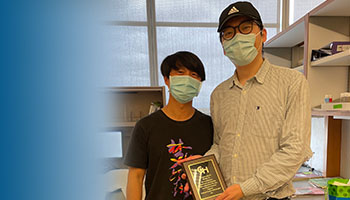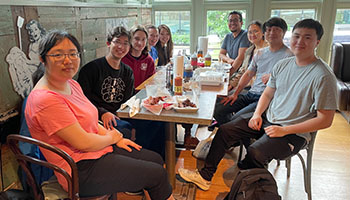HOW CAN WE HELP YOU? Call 1-800-TRY-CHOP
In This Section
Faculty Spotlight: Delving Deep Into Neural Function With Yuanquan Song, PhD

In his lab, Dr. Song studies neural function and development using genetics.
Editor’s Note: Welcome to our monthly Faculty Spotlight series, in which we sit down with faculty members at Children’s Hospital of Philadelphia Research Institute to learn more about their research and roles. Through these spotlights, our readers meet the diverse, dedicated, and distinctive individuals who lead our research community in our mission to improve children’s health. This year, we will be asking our featured scientists about mentorship — why it matters and how it has influenced their careers. In this Q&A, we feature scientist Yuanquan Song, PhD, scientist in the Department of Pathology and Laboratory Medicine. Stay tuned for more from our Faculty Spotlight series throughout this year!
Tell us a little about your research specialty and how long have you been at CHOP.
I started my lab at CHOP in May of 2016. My research specialty is in neural degeneration, regeneration, and neurodevelopment. Work in my lab aims to understand the cellular and molecular basis governing the formation, maintenance, and function of neural circuits under physiological and pathological conditions. We established a platform working with animal models in vitro and in vivo, integrated with our bioengineering expertise. We focus on three main areas: elucidating the mechanisms underlying neural de- and regeneration; modeling human neurodevelopmental disorders in flies; modeling brain tumorigenesis in flies.

Song Lab Team Members
Why did you choose to focus on that specialty?
I have a passion for delving deep into the mechanistic insights for processes governing neural development and function, using genetics. I sincerely hope that our work could help people with neural injury or diseases.
Can you describe a research project that you are excited about?
We are particularly keen about intrinsic and extrinsic reprogramming to promote neuro regeneration.
- We recently identified a neuronal intrinsic program acting as a brake on axon regeneration by sensing the mechanical force.
- We also have investigated the microenvironment inhibitory for regeneration and found that it is reversible and depends on the glial metabolic status.
- In collaboration with CHOP colleagues, we have been using our fly model to demonstrate the pathogenicity of genetic variants identified in human patients with neurodevelopmental disorders and determine the underlying molecular and cellular mechanisms leading to brain malfunction.
- We are developing new tools for stimulating or interrogating neuroregeneration.
What are the long-term research questions you hope to answer?
Our long-term goal is to provide the basis for designing novel therapies for treating neural injury and neurodevelopmental/neurodegenerative diseases.
How has mentorship influenced your career, and why do you believe it is important in science?
I truly appreciate the mentorships that I have received as a graduate student, a postdoc, and a junior faculty. They have paved my career path and propelled me to where I am and where I will be. I have experienced two styles of mentorship, and both are instrumental: one, hands-on and attention to details, which is critical for being a scientist; the other, visionary but flexible, which allowed me to explore my passion and helped develop independence. For myself, I have adopted a customized style that suits the need of individual mentees.